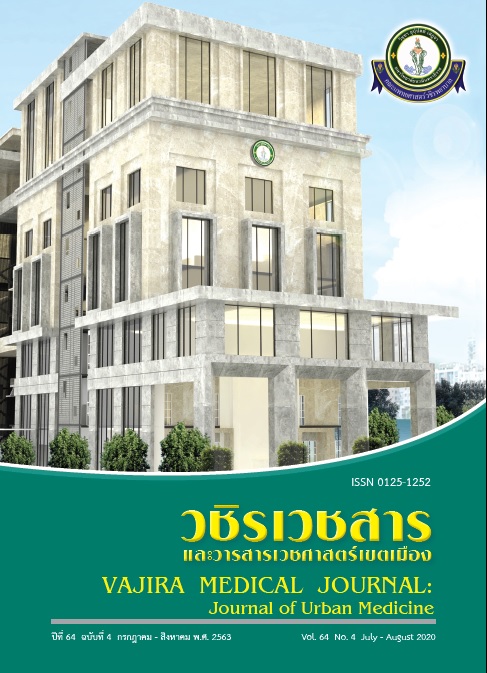An Educational Video Intervention to Increase Advance Care Planning in A Geriatric Clinic: A Randomized Controlled Trial
Main Article Content
Abstract
Introduction: Advance care planning should ideally be discussed with every geriatric patient in the ambulatory settings. However, only a small percentage of geriatric patients have had the discussion with their providers. We hypothesized that an educational video intervention would better promote interest compared to verbal advice alone.
Objectives: To compare the levels of interest in advance care planning between the educational video interventional group and the control group at the geriatric clinic.
Methods: Older adults aged 60 years and older who visited the clinic between November and December 2018 were enrolled and randomized into 2 groups. The intervention group was shown an 8-min video with verbal advice while the control group received standardized verbal advice. Participants were administered a Likert scale questionnaire after the intervention. The primary outcome was the proportion of participants who expressed interests in completing an advance directive.
Results: Of the 110 enrolled participants [55 in intervention group and 55 in controls: mean age was 67 years, and most of them were female (83%)]. There was no difference in the baseline characteristics between the two groups including age, sex, education, marital status, income, and health status. Ninety eight percent of the participants in video group expressed interests to complete an advance care plan, whereas only 67% of the control group did (P<0.001).
Conclusion: An educational video significantly increased awareness and interests among geriatric clinic patients compared to verbal education alone.
Downloads
Article Details
References
World health organization. Department of aging and life course. Integrated care for older people. Guidelines on community-level interventions to manage declines in intrinsic capacity: Geveva. 2017.
National Statistical Office Ministry of Digital Economy and Society. The survey of elderly population in Thailand 2017. Bangkok: Text and journal publication; 2017.
Emanuel L, Barry MJ, Stoeckle JD, Ettelson LM, Emanuel EJ. Advance directives for medical care—a case for greater use. N Engl J Med.1991;324(13):889–95.
Kohn M, Menon G. Life prolongation: views of elderly outpatients and health care professionals. J Am Geriatr Soc. 1988;36(9):840–44.
Gamble ER, McDonald PJ, Lichstein PR. Knowledge, attitudes, and behavior of elderly persons regarding living wills. Arch Intern Med.1991;151(2):277–80.
Emanuel LL, Danis M, Pearlman RA, Singer PA. Advance care planning as a process: structuring the discussions in practice. J Am Geriatr Soc.1995;43(4):440–46.
Sudore RL, Fried TR. Redefining the “planning” in advance care planning: preparing for end-of-life decision making. Ann Intern Med. 2010; 153(4):256-61.
Connors AF, Dawson NV, Desbiens NA, et al. A Controlled Trial to Improve Care for Seriously III Hospitalized Patients: The Study to Understand Prognoses and Preferences for Outcomes and Risks of Treatments (SUPPORT). JAMA 1995;274(20):1591–98.
Ting FH, Mok E. Advance directives and lifesustaining treatment: attitudes of Hong Kong Chinese elders with chronic disease. Hong Kong Med J. 2011;17(2):105-11.
Doukas DJ, Hardwig J. Using the family covenant in planning end-of-life care: obligations and promises of patients, families, and physicians. J Am Geriatr Soc. 2003; 51(8): 1155-58.
Ramsaroop SD, Reid MC, Adelman RD. Completing an advance directive in the primary care setting: what do we need for success. J Am Geriatr Soc. 2007; 55(2): 277-83.
Morrison RS, Morrison EW, Glickman DF. Physician reluctance to discuss advance directives: an empiric investigation of potential barriers. Arch Intern Med. 1994;154(20):2311–18.
Silveira MJ, Kim SY, Langa KM. Advanced directives and outcomes of surrogate decision making before death. N Engl J Med 2010; 362(13):1211-18.
Detering KM, Hancock AD, Reade MCSilvester W. The impact of advance care planning on end of life care in elderly patients: randomised controlled trial. BMJ. 2010;340:345.
Volandes AE, Paasche-Orlow MK, Barry MJ, Gillick MR, Minaker KLChang Y, et al. Video decision support tool for advance care planning in dementia: randomised controlled trial. BMJ.2009;338:b2159.
Epstein AS, Volandes AE, Chen LY, Gary KA, Li YAgre P, et al. A randomized controlled trial of a cardiopulmonary resuscitation video in advance care planning for progressive pancreas and hepatobiliary cancer patients. J Palliat Med.2013;16(6):623-31.
Hirschman KB, Abbott KM, Hanlon AL, Prvu Bettger JNaylor MD. What factors are associated with having an advance directive among older adults new to long-term care services? J Am Med Dir Assoc. 2012; 13(1): 827–38.
Alano GJ, Pekmezaris R, Tai JY, Hussain MJ, Jeune JLouis B, et al. Factors influencing older adults to complete advance directives. Palliat Support Care. 2010;8(3):267-75.
Garrett JM, Harris RP, Norburn JK, Patrick DLDanis M. Life-sustaining treatments during terminal illness: who wants what. J Gen Intern Med.1993;8(7):361-68.


